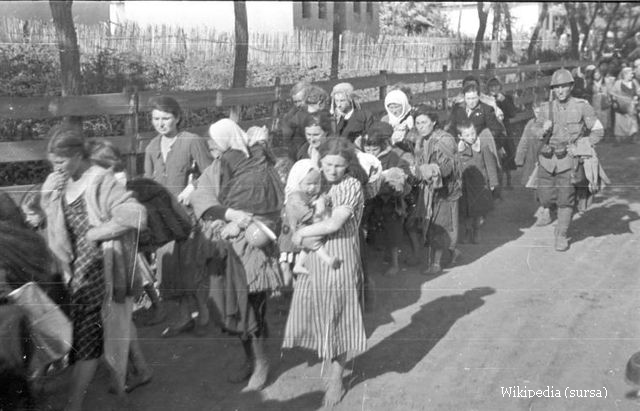Racial Legislation in Romania
In the 1930s, racism was one of the vilest forms of discrimination and persecution applied by states
Warning: Trying to access array offset on null in /home/web/rri.ro/public/wp-content/themes/rri/template-parts/content.php on line 53

Warning: Trying to access array offset on null in /home/web/rri.ro/public/wp-content/themes/rri/template-parts/content.php on line 98
Steliu Lambru,
18.12.2017, 12:45
The crisis of democracy and the ascent of intolerance led to racist legislation. The regime that initiated it was Nazi Germany, with the notorious 1935 Nuremberg anti-Semitic laws.
In Romania, the crisis of democracy in 1938 led to the ascent to power of authoritarian regimes who put into place anti-Semitic racial legislation, aimed at the Jewish population. We spoke to Lya Beniamin about this legislation. She is a historian, but also an eye witness to the events of the 1940s:
“This legislation appeared before the Antonescu government came to power, during the Gigurtu government, in August 1940, under the name The Legal Status of Jews in Romania. Previously, the Goga government had passed a law reviewing citizenship, in 1938, and the law came into effect in 1939, after that government had fallen. This is the first law that seriously affected a major part of the Jewish population in Romania. With that first law to review citizenship, about 200,000 Jews lost their citizenship. As a result, they lost a whole range of rights, mainly the right to employment and to property. What followed was a typically racist law, The Legal Status of Jews in Romania, which did not contain only legal provisions. It was a theoretical racial definition of what it meant to be a Jew. It was the law that stated what it meant to be a Jew, what the categories were that fell within the definition of a Jew, and which were affected by that law. That law also stood at the basis of racial legislation during the Antonescu government.”
Blood as a metaphor and supreme scientific criterion, and biology as an academic authority turned bio-politics into a paradigm for racial jurisprudence. Lya Beniamin told us that, in the early 1940s, during Marshal Ion Antonescus rule, the legislation established an individuals ethnicity based on inherited genetic traits and traits that they passed on to their offspring:
“Each law passed by the Antonescu governance has such an introduction, defining what it is to be a Jew. This was based on blood. If Jews believe that what makes them Jewish is the mother, according to the Antonescu racial laws the father matters just as much. It was believed that blood traits were stronger in men than in women, and that qualities and defects were much more obviously passed on by the male side, rather than the female side. The Legal Status of Jews was issued on August 8, 1940, and two or three days later another essentially racist law was issued, banning mixed marriages, and applying severe penalties against them. Public servants officiating marriages no longer issued married licenses for individuals of differing ethnic origins. If a Romanian wanted to marry a Jewish woman, they had no possibility of having a marriage officiated. There were cases in which people in mixed marriages got separated voluntarily, not because the law forced them to, there was no such provision. However, in some cases spouses broke up in order to make things easier for each other.”
The new legislation also covered children from mixed marriages. We asked Lya Beniamin what their legal status was:
“That also had to do with defining what it was to be a Jew. If the father was Jewish, even if he was separated from the Romanian or Christian mother, the child was believed to be a Jew. I published a memo written by a group of Christian mothers protesting the fact that children deemed to be Jewish had been kicked out of school. Such a memo written by Christian mothers was signed by Janina Ianoșis mother, wife of philosopher Ion Ianoși. Her mother was Christian Orthodox, the father was Jewish, and she was studying in an Evangelical school, which expelled her. Another example was philosopher Constantin Ionescu-Giulian, his father was Jewish, the mother was Christian, and he was considered to be Jewish.”
As a child, Lya Beniamin herself was expelled on the basis of racial legislation. We asked her what she remembers about that:
“The first shock came in 1940, when the law that expelled children from schools was passed. My family lived in a town called Tarnaveni. I was in the third grade and loved school. I was passionate about school, I was getting up at 6 in the morning for fear of being late. The headmaster of the primary school where I and other Jewish children were going to got an order to round up everyone in the schoolyard and proudly read out loud the law banning Jewish children from Romanian schools. The headmaster was a very decent man, and that night we went to the rabbi of Tarnaveni, which was a tiny town, with very few Jewish people. He told him to go to all the Jewish houses which had children in school and tell them not to send their children to school the following day, so that they wouldnt have to be put in such a humiliating situation. My mother came to me at 6 in the morning, and told me I was no longer allowed to go to school. It was a tremendous shock for me.”
Anti-Semitic racial legislation, profoundly unjust and destructive, disappeared when the Fascist government fell in 1945, never to return. (Translated by C. Cotoiu)






























